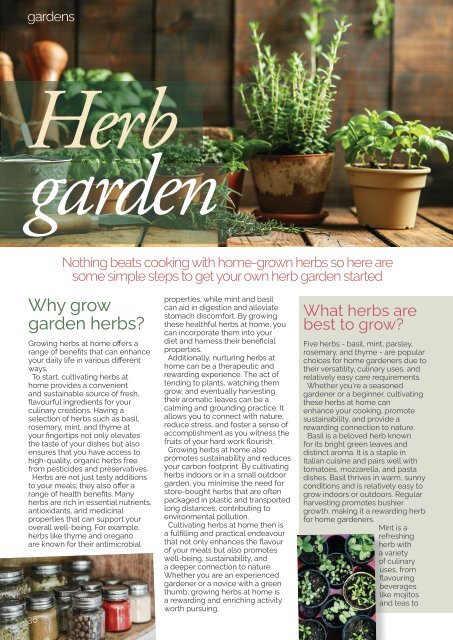Rhiwbina Living 62
Summer 2024
Summer 2024
You also want an ePaper? Increase the reach of your titles
YUMPU automatically turns print PDFs into web optimized ePapers that Google loves.
gardens<br />
Herb<br />
garden<br />
Nothing beats cooking with home-grown herbs so here are<br />
some simple steps to get your own herb garden started<br />
Why grow<br />
garden herbs?<br />
Growing herbs at home offers a<br />
range of benefits that can enhance<br />
your daily life in various different<br />
ways.<br />
To start, cultivating herbs at<br />
home provides a convenient<br />
and sustainable source of fresh,<br />
flavourful ingredients for your<br />
culinary creations. Having a<br />
selection of herbs such as basil,<br />
rosemary, mint, and thyme at<br />
your fingertips not only elevates<br />
the taste of your dishes but also<br />
ensures that you have access to<br />
high-quality, organic herbs free<br />
from pesticides and preservatives.<br />
Herbs are not just tasty additions<br />
to your meals; they also offer a<br />
range of health benefits. Many<br />
herbs are rich in essential nutrients,<br />
antioxidants, and medicinal<br />
properties that can support your<br />
overall well-being. For example,<br />
herbs like thyme and oregano<br />
are known for their antimicrobial<br />
36<br />
properties, while mint and basil<br />
can aid in digestion and alleviate<br />
stomach discomfort. By growing<br />
these healthful herbs at home, you<br />
can incorporate them into your<br />
diet and harness their beneficial<br />
properties.<br />
Additionally, nurturing herbs at<br />
home can be a therapeutic and<br />
rewarding experience. The act of<br />
tending to plants, watching them<br />
grow, and eventually harvesting<br />
their aromatic leaves can be a<br />
calming and grounding practice. It<br />
allows you to connect with nature,<br />
reduce stress, and foster a sense of<br />
accomplishment as you witness the<br />
fruits of your hard work flourish.<br />
Growing herbs at home also<br />
promotes sustainability and reduces<br />
your carbon footprint. By cultivating<br />
herbs indoors or in a small outdoor<br />
garden, you minimise the need for<br />
store-bought herbs that are often<br />
packaged in plastic and transported<br />
long distances, contributing to<br />
environmental pollution.<br />
Cultivating herbs at home then is<br />
a fulfilling and practical endeavour<br />
that not only enhances the flavour<br />
of your meals but also promotes<br />
well-being, sustainability, and<br />
a deeper connection to nature.<br />
Whether you are an experienced<br />
gardener or a novice with a green<br />
thumb, growing herbs at home is<br />
a rewarding and enriching activity<br />
worth pursuing.<br />
What herbs are<br />
best to grow?<br />
Five herbs - basil, mint, parsley,<br />
rosemary, and thyme - are popular<br />
choices for home gardeners due to<br />
their versatility, culinary uses, and<br />
relatively easy care requirements.<br />
Whether you're a seasoned<br />
gardener or a beginner, cultivating<br />
these herbs at home can<br />
enhance your cooking, promote<br />
sustainability, and provide a<br />
rewarding connection to nature.<br />
Basil is a beloved herb known<br />
for its bright green leaves and<br />
distinct aroma. It is a staple in<br />
Italian cuisine and pairs well with<br />
tomatoes, mozzarella, and pasta<br />
dishes. Basil thrives in warm, sunny<br />
conditions and is relatively easy to<br />
grow indoors or outdoors. Regular<br />
harvesting promotes bushier<br />
growth, making it a rewarding herb<br />
for home gardeners.<br />
Mint is a<br />
refreshing<br />
herb with<br />
a variety<br />
of culinary<br />
uses, from<br />
flavouring<br />
beverages<br />
like mojitos<br />
and teas to

















